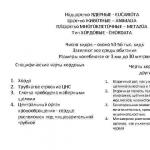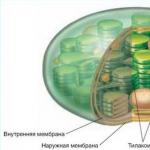Suffixes of adjectives. A17
A 17 SPELLING OF SUFFIXES OF NOUNS AND ADJECTIVES
Spelling noun suffixes
1. Suffixes that are unchanged and do not depend on any conditions:
Rel (running) - in nouns,
Aries (chatter) formed from verb stems
From (latitude)
Spine (surface)
Et (poverty)
Yes (buoyancy)
Yestv (o) (youth)
In (height) - in nouns,
Wrong (curvature) formed from the basics
In(stv) (most) adjectives
2. Suffixes, with the help of which words with new lexical meanings are formed:
- CHIC, -SHCHIK (designation of people's occupation).
Suffix –CHIK written after consonants D, T, 3, S, F:
D SPEAKER
T CHIC distributor
F defector
3 NARRATOR
Census taker
After the remaining consonants it is written-schik (trainer, drummer).
After L before –SHCHIK, b (feller) is used.
In foreign words after T it is written–CHIK (diamond maker, pawnbroker, flute maker).
3. Suffixes that give the word new additional shades.
a) -EK / -IK (peas - key):
if in R. p. the vowel drops out - E(lock - padlock),if it doesn’t fall out - And(locomotive - little train).
b) -OK (heel); -ONK (little hand), -ONK (little fox) - after a root ending in a hard consonant;-ENK (-ENK) (little river) - after a root ending in a soft consonant. Exceptions: bunny, bunny, good girl.
O - stressed, E - unstressed.
c) -ETS (breadwinner) - in masculine words, -ITs (nurse) - in feminine words. In nouns neuter after -ec written O - under stress(letter). If the stress falls on the stem --its(e) (dress).
d) -ICHK- (clever girl) - from noun. on -ITs (clever girl) -, -ECHK (Tonechka) - in other cases, including in nouns in-me.
e) -IN-K- (pea) - in words formed from noun. on-IN (pea)-, -EN-K- (ladder) - in words with a base on-H-; -ENK- (beggar woman) - in words denoting female persons.
Remember: felt boots.
f) -USHK- (head) - in noun masculine, feminine;-YSHK (feather) - in noun neuter;-ishek/ -ushek/-eshek (sparrow)- in noun male.
g) –SEARCH-/-ESCH- After these suffixes in masculine and neuter nouns it is written -E(ashes), feminine A (hands).
Spelling adjective suffixes
1 .-OV (lead) - after hissing and C under stress;-EV (suede) - in an unstressed position.
2. -IV (jealous) - under stress,-EV (lilac) - in an unstressed position. Exceptions: merciful, holy fool, gentle.
CHIV (changeable), -LIV (sympathetic) - always written with the letter I. Exceptions: gutta-percha.
CHAT (patterned). Exception: plank. All consonants (except C) before the suffix -chat are preserved (freckle - freckled); C//T (tile - tiled).
–IST (pedigreed).
TO (fisherman) is written:
- in qualitative adjectives(bold);
- in relative adjectives with stems K, Ch, C(blacksmith - blacksmith, weaver - weaver).
Exceptions: Uzbek (Uzbek), Tajik (Tajik), Uglich (Uglich);
SC (French) - in relative adjectives. In adjectives formed from nouns with a stem in Нь, b is not written:Kazan - Kazan. Exceptions: month names(June - June), except for January. Before the suffix -sk alternation occurs: G/F(Varangian - Varangian) -, H/Sh (Lakh - Lyashsky).
ESC (prophetic);
EH (sultry). Exceptions: worthy, unworthy.
Remember: hectic, planked, sandy, lilac, gutta-percha, polished, cobblestone, trifling, freckled, obsessive.
In this article:
A17 does not include spellings with n - nn(a separate task A13 is devoted to this topic).
But even without them, the volume of material is large, because Russian is a language with a developed suffix system: there are many suffixes. A literate person needs to know the spelling of suffixes of nouns, adjectives, adverbs and verbs. However, not all suffixes are found in KIMs. The wording of the tasks involves searching for words either with a letter e, or with a letter And. This allows you to significantly narrow the circle of “necessary” suffixes. Moreover, in the vast majority of training variants prepared by FIPI, the tasks actually contain mainly verbs in the indefinite form, participles, gerunds, and adjectives. Are there any questions regarding the spelling of noun suffixes? Yes, because, firstly, this is provided for by the “Generalized Plan of Examination Work for the Unified State Exam in the Russian Language” and, secondly, noun suffixes with a diminutive meaning are found in tasks.
I propose the order of presentation of reference material for preparation not in accordance with tradition (from nouns to other parts of speech), but according to the frequency with which words appear in KIMs. So, the order is as follows: verb forms (including participles and gerunds), adjectives, and only then nouns (no more than 10% of them were found). Anyone who claims the highest score must follow us to the very end.
I advise everyone to carefully consider the examples. A consciously learned example will serve as a model for reasoning by analogy.
Verb suffixes
1). Suffixes --ova-, -eva-, -yva-, -iva-: draw, grieve - be late, evaluate
Check! Determine the 1st person singular form of the present or future tense!
If in the 1st person singular form of the present or future tense there are combinations
- wow, wow, then write the suffixes -ova-(-eva-): advise - I advise, command - I command
- yay, yay, then write the suffixes -ыва-(-iva-): to be late - I’m late, to consider - I’m considering
Attention:
The phonetic variants of suffixes given in brackets occur after soft consonants.
2). Distinguishing suffixes-e- + -va- and -yva- (-iva-): to overcome, to fall ill - to justify, to reassure
Attention to emphasis!
The suffix -va- is always stressed: overcome, get sick.
Before the suffix -va- write the suffix -e-.
The suffixes -yva-, -iva- are unstressed: write down, glue, aim.
Do not confuse:
In words like pour, chant letters And And e fundamentally.
3). Suffixes in the infinitive form of the verb: see, paint
The suffixes of verbs of the 1st conjugation are different. The suffix of the verb stem of the 2nd conjugation is -i-.
Attention:
Exception verbs for this task are not of interest: after all, you need to recognize the letter not in the ending, but in the suffix. Therefore, if you define a letter in the suffix of an indefinite form of a verb, feel free to write -e- in exception verbs on eat with an unstressed letter in the suffix: to offend, to see, to hate, to depend and derivatives from them: to see, to envy, to be offended, and others like that. In other exception words, the suffix is in stressed position.
4). Suffixes in participles and gerunds.
Attention:
In A17, no one checks whether you know the suffixes of participles and gerunds. In participles and gerunds, vowel stems are missing, from which the data in the form assignments are derived.
Examples from CIMs:
gluing, pulling out, aiming, hoping, worming, squealing
Therefore, you should not be distracted by the form of participles and gerunds, or remember their suffixes. We need to do something else: learn to accurately determine from which verb participles and gerunds are formed.
Gluing - from: glue
pulling out - from pulling out
aiming - from aiming
hopeful - from hoping
wormed...wormed - from wormed
squeal...vaya - from squeal
Therefore, the rules given above must be applied.
Make no mistake:
A typical mistake is mixing verbs of different types when restoring the original form. For example, it is a mistake to believe that the participle gluing derived from the verb glue, aiming- from take aim and so on. In many cases, such an error will lead to an incorrect identification of the vowel letter.
Right: Gluing derived from glue, aiming- from aim.
Adjective suffixes
Only suffixes of denominal adjectives are considered here, because it is this material that relates to the topic (verbal adjectives are words whose suffixes contain the spelling n-nn). The list of suffixes of adjectives formed from nouns is not limited to the two rules given below, but the training versions of KIMs include words specifically for these rules.
1). Suffixes-iv-, -ev-, -liv-, -chiv-: handsome - fighting, happy, trusting
Attention to emphasis!
In adjectives formed from nouns:
- under stress write the suffix -iv-: beautiful
- without emphasis - suffix -ev-: combat.
Write the suffixes -liv-, -chiv- and with stress: happy and without stress: trusting.
2). Suffixes-ov-, -ovat-, -ovit- - -ev-, -evat-, -evit-: businesslike, grayish, poisonous - speech, bluish, combative
Attention to the last consonant of the root!
After hard consonants write the suffixes -ov-, -ovat-, -ovit-: businesslike, grayish, poisonous.
After soft consonants, hissing, h And ts write the suffixes -ev-, -evat-, -evit-: speech, bluish, militant.
Noun suffixes
1. Suffixes with the meaning of person (producer of the action).
There are many suffixes with the meaning of person, but, fortunately, not all of them cause errors when writing words. Rarely does anyone make a mistake with suffixes:
East: handball player, tractor driver
-nickname-: road worker, railway worker
-naut-: astronaut
-ets-: messenger
-er-: combine operator
Erroneous suffixes: -tel-, as well as -chik-, -schik-. They are worth repeating.
1). Suffix-tel-: teacher
Remember this suffix and always write it the same way, with the letter e!
Write the suffix -tel- in words denoting persons by occupation: teacher, writer, driver.
2). Suffixes-chik-, -schik-: pilot, mason, asphalt paver
Attention to the last consonant of the stem!
After:
- consonants t, d, s, h, g write the suffix -chik-: translator, pilot, peddler, carrier, defector
- write the rest of the consonants with the suffix -schik-: ferryman, glazier, mason, lamplighter
Attention:
Before the suffix -chik- letters k, ts, h are replaced by T: razdat+-chick- ← distribution.
Write a soft sign only after l: roofer, glazier.
2. Suffixes with a diminutive meaning.
The Russian language has many suffixes with a diminutive meaning. What these suffixes are and how to write them, you will have to figure out. Let's limit ourselves, however, to suffixes in which letters are written e And And, which KIMs guide us towards.
1). Suffixes-hic-, -ek-: ball - handkerchief.
Watch for the fluent vowel e when changing a word!
If when changing a word, it
- the vowel sound [and] is preserved, write the suffix -ik-: ball - balls
- the vowel sound disappears, write the suffix -ek-: handkerchief - handkerchief
2). Suffixes-ets-, -its-: brother - smart, coat - dress
Find out the gender of the noun!
In nouns
- masculine write the suffix -ets-: brother, finger
- feminine - -its-: beautiful, smart
- The neuter gender can be both -ets- and -its-:
- in the pre-stressed syllable (before the stress) write -ets-: paltetso´, letter´
- in an unstressed syllable (after stress) write-its-: dress, chair
3). Suffixes-echk-, -ichk-: daughter, place, Vanechka - onion
For feminine words, determine the derivative word!
In nouns, write the suffix -echk-: little insect, daughter, place, time, Vanechka, Sashechka
Do not confuse:
In feminine nouns formed from nouns with the suffix -its-, write the suffixes -ich- and -k-:
tit← tit, button←button, onion←onion.
4). Suffixes-onk-(-enk-): apple tree - daughter
Determine what sound is before the suffix!
In nouns after
- for hard consonants write the suffix -onk-: kitchenette, kitty, laponka
- vowels, hissing and soft consonants - suffix -enk-: Zoenka, darling, daughter, grandmother
5). Suffix-To- in combinations ink, enk: middle, cherry
Look for a productive basis!
If in feminine nouns with the suffix -k- the productive stem
- on in, write the suffixes -in- and -k-: middle+ka←middle
- on n, write a combination of letters enk: cherry+ka←cherry.
3. The suffix -en- in indeclinable nouns: tenses, names
Remember:
10 nouns per me
:
burden, tribe, time,
seed, crown, stirrup,
banner, flame,
udder, name
Write the suffixes -en-(-yon-) in all plural forms, as well as in the genitive, dative, instrumental and prepositional cases in the singular.
In contact with
Spelling: Spelling suffixes of various parts of speech(except -Н-/-НН-): spelling of suffixes of nouns, adjectives, verbs and adverbs.
1. Spelling of noun suffixes
Suffixes -chick/-schik. Suffix -chick written after roots ending in d, t, z, s, zh, suffix -schik- in other cases (scout, mark, sample, subscriber, defector, porter, changer).
Suffixes -ek/-ik. Suffix -ek written if, when a word is declined, a vowel in the suffix is dropped; suffix -ik it is written if, when the word is declined, the vowel in the suffix is preserved (lock - lock, key - key).
Suffixes -ets/-its. Suffix -ets is written:
- in masculine nouns (brother, businessman, loaf);
- in neuter nouns, when the stress falls on the ending (writing, paltetso).
Suffix -its- is written:
- in feminine nouns (street, soapbox, mill);
- in neuter nouns, when the stress falls on the base (dress, structure).
Suffixes -ichk-/-echk-. Suffix -ichk- written in feminine nouns formed from nouns in -its-(onion - onion, mitten - mitten). Suffix -echk- written in words formed from nouns Not on -its- (nanny, little basket, Tanechka).
Suffixes -yshk-/-ushk-/-yushk-. Suffix -ysk- written in neuter nouns (the ending -o is written after it) (grain, sun, bottom). Suffix -ushk- written in masculine and feminine nouns (grandfather, girl, nightingale). Suffix -yushk- is written in words of all three genders (polyushko, dolyushka, uncle).
Suffix -ink-(-in- + -k-)/-enk-. Suffix -inc- written in words formed from nouns with a suffix -in-(straw - straw, rowan - rowan). Suffix -enk- written in diminutive forms of nouns -na, -nya, who have R. p. pl. h. the soft sign is not written at the end ( spinner - spinner - spinner, tower - tower - turret ), as well as in words refugee, sissy, French, cherry and so on.

2. Spelling suffixes of adjectives
Suffixes -iv-/-ev-, -evat-/-evit-. Suffix -iv- written with emphasis -ev- in an unstressed position (handsome, arrogant, combative, dashing). Exceptions: merciful, holy fool.
Suffixes -ov- And -ev-. After sizzling and ts the suffix is written under stress -ov-, without accent - suffix -ev-(brocade, pepper, reed, key, end, bucket, clothing).
Suffixes -chiv-/-liv-. Always written with And(friendly, changeable).
Suffixes -k- and -sk-. Suffix -To- is written:
- in qualitative adjectives that have a short form (sharp - sharp, low - low);
- in adjectives formed from nouns with stems k, ch, ts, the suffix -sk- is simplified to k; the sounds k, ch alternate with c (Nenets - Nenets, Cossack - Cossack, weaver - weaver). Exceptions: Uzbek - Uzbek, Uglich - Uglich).
Suffix -sk- preserved in relative adjectives with a consonant stem d, t, h, s(sailor, French, fraternal, urban) and with a base on consonants g, k, x, which often alternate (Onega - Onega).

3. Spelling verb suffixes
- In past tense verbs before a suffix -l- the same letter is written as in the indefinite form before -th(see - saw, facilitate - facilitated, accept - accepted).
- Suffixes are written in the infinitive form of the verb and in the past tense form -ova-, -eva-, if in the 1st person the verb ends in -yu, -yu(I draw - draw).
- If the 1st person verb ends in -I am, -I am no emphasis on A, then the suffix -yva-, -iva- persists (to think - I'm thinking, to finish - I'm finishing).


1. Suffix -iv- has an accent, for example: kras And wow, really And vy (exceptions: m And lusty and yur O marvelous); in unstressed position it is written -ev- eg: fights O th, sir e new.
In suffixes -liv- And -chiv-, derived from -iv-, written And eg: caring, arrogant.
2. Unstressed suffixes -ov-, -ovat-, -ovit- written after hard consonants; -ev-, -evat-, -evit-- after soft consonants, sibilants and ts. For example:
- a) businesslike, reddish, gifted;
b) vechevoy, bluish, glossy, Barents Sea.
3. In adjectives on -whose formed from nouns in -shka, before h in unstressed position it is written e, under stress - A, for example: lie down y shechiy - frog A chy, k O shechiy - kosh A chiy.
4. The spelling of consonants before the suffix differs -at- in adjectives like plank - freckled; letter sch is written in cases where the sound it denotes entirely refers to one meaningful part of the word (morpheme): dosk-a - dosh-at-y ( sk alternates with sch; cf.: wax - wax-an-oh, flat - flat). If in the generating stem before the suffix -To- letters stand h, s, st, w, then they are saved, and To alternates with h: vesnush-k-a - freckle-chat, brus-ok - brus-chat, furrow-k-a - furrow-chat (cf.: rez-k-y - rez-ch-e, whip-k-y - whip-ch-e).
5. Before the suffix -chat-, which is always written through A, final ts the base is replaced T, for example: krupits-a - krupit-chat, lash-a - lash-chat, tiles-a - tile-chat.
6. Final consonant stems d And T before the suffix -sk- are preserved, for example: Volgograd - Volgograd, fleet - naval.
After final consonants stems k, h And ts suffix -sk- simplified in -To-, and To And h the basics change to ts, For example. farmhand - farmhand, weaver - weaver, German - German. Some adjectives are preserved before -sk- consonants To And h, for example: Uzbek - Uzbek, Tajik - Tajik, Uglich - Uglich.
In adjectives formed from geographical names with a stem ending in c, it is written:
- A) -ts-sky, if before ts there is a consonant (except ts), for example: Konstanz - Konstanz, Pfalz - Palatinate;
b) -ts-ky, if before ts there is a vowel, for example: Yelets - Eletsk (exceptions: Graz - Gratz, Mets - Metz);
V) -its-ky, if before ts worth it too ts, for example: Nice - nice.
7. With suffix -sk- relative adjectives are written (they do not form a short form): Circassian - Circassian, Kavkaz - Caucasian; with suffix -To-- qualitative adjectives (they form a short form): viscous (viscous), low (low), liquid (liquid).
In adjectives formed from geographical names ending in With with a preceding consonant, there are fluctuations in spelling before the suffix -sk-, for example: Wales - Welsh and Welsh, Araks - Araks and Araxes. Reims is Reims and Reims, but Daugavpils is Daugavpils, Helsingfors is Helsingfors. If before the suffix -sk- a vowel is written, then the second With is preserved, for example: Vilnius - Vilnius.
If the stem ends in ss, then before the suffix -sk- one With is omitted, since in the Russian language three identical consonants are not written in a row, for example: Odessa - Odessa, Cherkasy - Cherkasy.
If the stem of a foreign word ends in sk, then before the suffix -sk- first To omitted, for example: Damascus - Damascus, San Francisco - San Francisco, Etruscan - Etruscan (but: Basque - Basque, Oski - Osk).
Russian geographical names in sk form adjectives without the help of a suffix -sk-, for example: Minsk - Minsk, Spassk - Spassky.
Note 1. In the words Bordeaux, Tartu, etc. one thing is written With, since the generating base does not end with With(Bordeaux, Tartu).
8. If the stem of a noun ends in -ny And -ry, then before the suffix -sk- letter b not written, for example: horse - horse, beast - brutal, Ryazan - Ryazan, Siberia - Siberian, Tyumen - Tyumen.
Exceptions:
- 1) adjectives formed from the names of the months: June, September, October, November, December (but: January), as well as the expression day-day;
-
2) adjectives formed from some foreign geographical names: Kuen-Lun, Sichuan, Taiwanese, Tien Shan, Wuhan; in the spelling of the adjective formed from Gdynia, fluctuations are observed - Gdynia - Gdynia.
9. In adjectives formed from stems on k, ts, h, before the suffix -n- is written h, for example: starling - starling, boredom - boring, dacha - dacha.
In adjectives from stems to X before the suffix -n- is written w, for example: turmoil - hectic.
Note 1. Rule for writing combinations chn in the specified conditions, it also applies to nouns, for example: bakery, birdhouse, birdhouse. Female patronymics are also written from male patronymics on -ich, for example: Ilyinichna, Nikitichna. However, in some words the combination is written shn, for example: gorodoshnik, dvurushnik, raeshnik, although towns, hand, rayok.
Note 2. It is necessary to distinguish between tray, lotochnik (from tray) and lotoshny, lotoshnik (from loto).
Note 3. Everyday and everyday are equally acceptable.
10. Two n are written:
- a) in suffixes -enn-: industrial, straw; -he N-: revisionary, revolutionary;
b) at the junction of the base ending in n, and suffix n: nominal, sleepy.
11. One n written in suffixes -in-: snake, swan; -an- (-yang-): sandy, silver.
Exceptions: wooden, tin, glass.
Note 1. Adjectives crimson, spicy, drunk, red, ruddy, windy (but: windless), green, young, pork - written with one n.
Note 2. Nouns formed from the corresponding stems are also written with one or two n, for example:
- a) woodcutter, hempsmith, oilman, sandstone worker, silversmith (master); silver (coin), unmercenary; hotel; budenovka;
b) dime, warrior, birthday boy, raspberry, swindler, nephew, traveler, relative, fieldfare, supporter, cavalry, larch.
Note 3.
- a) oil (for oil, from oil, on oil), for example: oil switch, oil lamp, oil pump, oil stain, oil paint;
b) oily (stained, soaked, oiled), for example: oily hands, oily porridge, oily pancake; figuratively: oily eyes; See also: Maslenitsa - Maslenitsa.
Note 4. Adjectives should be distinguished:
- a) windy, windy day, windy person;
- b) wind: wind engine;
c) chickenpox: chicken pox.
12. The short forms of adjectives store so many n, how many in full form, for example: the road is long - long, the dawn is rosy - rosy, the gestures are artificial - artificial.
13. Adjectives differ in -Insky and on -ensky(unstruck).
1) On -Insky adjectives end:
- 1a) if it is possible to form possessive adjectives from the corresponding nouns -in, for example: Anninsky (Annin), Mariinsky (Mariin), sister (sestrin);
1b) if they are formed from geographical names on -and(s), for example: Mytishchi (Mytishchi), Sochi (Sochi), but: Liven (from Livny, Liven), as well as Romny (from Romny, Romen);
1c) if they are formed from geographical names on -and I), for example: Elninsky (Yelnya), Okhtinsky (Ohta), Yalta (Yalta). However, according to tradition, Penza (although Penza), Presnensky (although Presnya) and some others are written, as well as Kolomensky, Pesochensky (fluent e at the base).
2) On -ensky adjectives formed according to a different type end: for example: Grozny (Grozny), Zarechensky (Zarechye), Grodno (Grodno), Rovno (Rovno, in contrast to the previous spelling Rivne); and also see subparagraph 1, b and c.
The correct spelling of suffixes in adjectives depends on many factors. For greater convenience, three basic rules have been identified, which are described in detail in this article. Here you will find out in which suffixes errors are most often made, on which category of adjective the spelling of consonants in suffixes depends, in which cases -n- and -nn- are written.
In Russian, the spelling of adjective suffixes depends on the grammatical features of the word, the method of its formation and meaning. Conventionally, the rules for spelling suffixes of adjectives are usually divided into three categories:
- Writing vowels in adjective suffixes;
- Writing consonants in adjective suffixes;
- Writing in adjective suffixes " -n-" And " -nn-».
Spelling vowels in adjective suffixes
The most common mistakes made when writing vowels in the following adjective suffixes:
- -chiv-, -liv- – always written with -And- (examples: hardy, reckless).
- -iv- written in adjectives under stress (careless, beautiful), -ev- in unstressed position (root, style).
- -ov- (-ovat-, -ovit-) written if the stem of the adjective ends in a hard consonant (businesslike, rustic), -ev- (-evat-) – after soft, sibilant consonants and ts (speech, reddish).
- -onk- used if the adjective stem ends in g, k, x (tiny, dry), -enk- – after any other final stem letters (fair, kind).
- -ensk- used in adjectives derived from geographical names (Kerch, Frunze), -insk- used in cases where the adjective is formed from a geographical name on -a (s), -i (s) (Yalta, Khimki).
- -whose written in adjectives formed from nouns in -shka (feline, boyish).
- -th used in adjectives formed from nouns in -ik, -chik, -nik (gardener, landowner).
- -an-, -at- used in words like paved, waxed(in this case, it is possible to alternate the final roots of the word - board – plank).
- -chat- used in adjectives formed from nouns with a stem on c (grain - grainy, tile - imbricated).
- -insk- (-iy-) + -sk- used in adjectives formed from stems on -in (materin – maternal, Elizavetin – Elizabethan).
- -them- written with emphasis (vulnerable, soluble), -eat- no accent (incessant, struck).
Spelling consonants in adjective suffixes
The spelling of consonants in adjective suffixes in some cases depends on their lexico-grammatical category:
- -sk-
used in relative adjectives (Canadian, giant).
- If the stem of a word ends in -With- with a preceding vowel, then the final stem disappears (Odessa - Odessa, Worms - Worms, but Belarusian is Belarusian, Daugavpils is Daugavpilsian).
- In adjectives formed from Russian geographical names for -sk- always written alone s (Privolzhsk - Privolzhsky, Amursk - Amur), in foreign languages – two s (Damascus - Damascus, Etruscan - Etruscan). Exceptions: Basque - Basque, Oski - Oski.
- When forming adjectives from nouns with a base on a soft sign (as well as -ry, -ny) it is not written in adjectives (jaeger - huntsman, Kuban - Kuban, January - January). Exceptions - month names (November, October, June), combination day-to-day, adjectives from foreign names ( Tien Shan, Taiwanese), adjectives with soft l (rural, April).
- -To-
used:
- In qualitative adjectives (high, wide);
- -ts (Cherepovets – Cherepovets, German – German);
- In relative adjectives formed from nouns with k, h alternating on ts (barge hauler - burlatsky, weaver - weaver).
Spelling Н and НН in adjective suffixes
One N written in adjectives:
TOP 4 articleswho are reading along with this
- No suffixes (green, lamb);
- With suffixes -an (-yang-), -in- (duck, leather);
- In prefixless adjectives windy, oily;
- In adjectives spicy, red, drunk, zealous.
NN used in adjectives.





